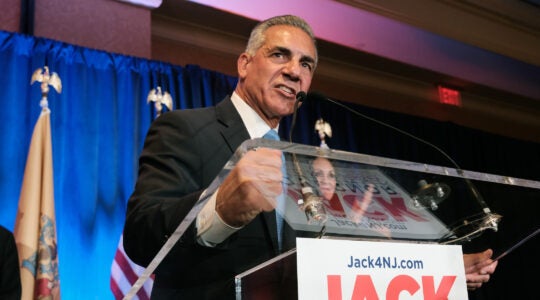WASHINGTON (JTA) — President Barack Obama announced plans to enhance military assistance to Arab Gulf states at a meeting where the sides discussed the emerging Iran nuclear deal.
“The United States is prepared to work jointly with GCC member states to deter and confront an external threat to any GCC state’s territorial integrity that is inconsistent with the [United Nations] Charter,” Obama said Thursday after concluding a meeting with members of the Gulf Cooperative Council at the Camp David retreat in Maryland.
“In the event of such aggression or the threat of such aggression, the United States stands ready to work with our GCC partners to urgently determine what actions may be appropriate, using the means at our collective disposal, including the potential use of military force, for the defense of our GCC partners,” he said.
That means “we will increase our already extensive security cooperation,” he said.
Gulf Arab states, like Israel, are wary of the emerging nuclear deal between Iran and the major powers, in part because they fear it will free Iran to expand its backing for Shiite-backed powers in Yemen, Lebanon, Syria and Iraq, and will enable Iran to expand its support for terrorism.
A summary statement said enhancements would be in the areas of “fast-tracking arms transfers, as well as on counter-terrorism, maritime security, cybersecurity, and ballistic missile defense.”
It also said that Obama had briefed the GCC leaders on the Iran talks.
The leaders “emphasized that a comprehensive, verifiable deal that fully addresses the regional and international concerns about Iran’s nuclear program is in the security interests of GCC member states as well as the United States and the international community,” it said.
“The United States and GCC member states oppose and will work together to counter Iran’s destabilizing activities in the region and stressed the need for Iran to engage the region according to the principles of good neighborliness, strict non-interference in domestic affairs, and respect for territorial integrity,” the summary statement said.
At the same press conference, Obama said that the prospect of a two-state solution between Israel and the Palestinians “seemed distant” in the wake of the new governing coalition formed by Israeli Prime Minister Benjamin Netanyahu.
“I know that a government has been formed that contains some folks who don’t necessarily believe in that premise,” Obama said. “But that continues to be my premise.”
Netanyahu’s government is the first in at least a decade that does not include parties that embrace the two-state solution. It is considered among the most right-wing governments in Israeli history.
Obama alluded to the 1978 Camp David Accords, struck between Egypt and an Israeli government also led by a right-wing Likud prime minister, Menachem Begin.
“And since we’re up here at Camp David, I think it’s important to remind ourselves of the degree to which a very hard peace deal that required incredible vision and courage and tough choices resulted in what’s now been a lasting peace between countries that used to be sworn enemies,” he said. “That prospect seems distant now. But I think it’s always important for us to keep in mind what’s right and what’s possible.
Also on Thursday, Palestinian President Mahmoud Abbas presented new preconditions to restarting peace talks with the new Israeli cabinet, Israel Radio reported. Abbas called for the halt of all Jewish construction in the West Bank and for the immediate release of Palestinians imprisoned before the Oslo Accords, who were supposed to be released in 2014. He also said that peace talks will not resume unless he is guaranteed that they will last a full year.
Relations between the United States and Israel were strained by Netanyahu’s perceived reluctance to move ahead with peace talks despite an aggressive push in that direction by Obama and his secretary of state, John Kerry. Peace talks collapsed a year ago and were followed by a war in the summer between Israel and Hamas, which controls the Gaza Strip.
JTA has documented Jewish history in real-time for over a century. Keep our journalism strong by joining us in supporting independent, award-winning reporting.





